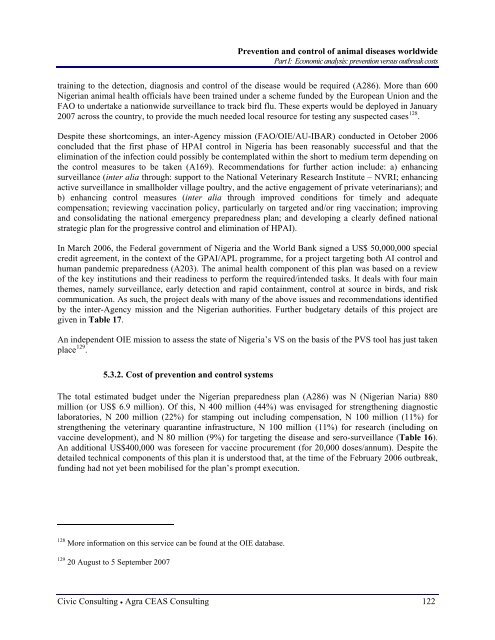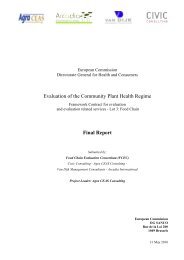2294 part 1 final report.pdf - Agra CEAS Consulting
2294 part 1 final report.pdf - Agra CEAS Consulting
2294 part 1 final report.pdf - Agra CEAS Consulting
You also want an ePaper? Increase the reach of your titles
YUMPU automatically turns print PDFs into web optimized ePapers that Google loves.
Prevention and control of animal diseases worldwide<br />
Part I: Economic analysis: prevention versus outbreak costs<br />
training to the detection, diagnosis and control of the disease would be required (A286). More than 600<br />
Nigerian animal health officials have been trained under a scheme funded by the European Union and the<br />
FAO to undertake a nationwide surveillance to track bird flu. These experts would be deployed in January<br />
2007 across the country, to provide the much needed local resource for testing any suspected cases 128 .<br />
Despite these shortcomings, an inter-Agency mission (FAO/OIE/AU-IBAR) conducted in October 2006<br />
concluded that the first phase of HPAI control in Nigeria has been reasonably successful and that the<br />
elimination of the infection could possibly be contemplated within the short to medium term depending on<br />
the control measures to be taken (A169). Recommendations for further action include: a) enhancing<br />
surveillance (inter alia through: support to the National Veterinary Research Institute – NVRI; enhancing<br />
active surveillance in smallholder village poultry, and the active engagement of private veterinarians); and<br />
b) enhancing control measures (inter alia through improved conditions for timely and adequate<br />
compensation; reviewing vaccination policy, <strong>part</strong>icularly on targeted and/or ring vaccination; improving<br />
and consolidating the national emergency preparedness plan; and developing a clearly defined national<br />
strategic plan for the progressive control and elimination of HPAI).<br />
In March 2006, the Federal government of Nigeria and the World Bank signed a US$ 50,000,000 special<br />
credit agreement, in the context of the GPAI/APL programme, for a project targeting both AI control and<br />
human pandemic preparedness (A203). The animal health component of this plan was based on a review<br />
of the key institutions and their readiness to perform the required/intended tasks. It deals with four main<br />
themes, namely surveillance, early detection and rapid containment, control at source in birds, and risk<br />
communication. As such, the project deals with many of the above issues and recommendations identified<br />
by the inter-Agency mission and the Nigerian authorities. Further budgetary details of this project are<br />
given in Table 17.<br />
An independent OIE mission to assess the state of Nigeria’s VS on the basis of the PVS tool has just taken<br />
place 129 .<br />
5.3.2. Cost of prevention and control systems<br />
The total estimated budget under the Nigerian preparedness plan (A286) was N (Nigerian Naria) 880<br />
million (or US$ 6.9 million). Of this, N 400 million (44%) was envisaged for strengthening diagnostic<br />
laboratories, N 200 million (22%) for stamping out including compensation, N 100 million (11%) for<br />
strengthening the veterinary quarantine infrastructure, N 100 million (11%) for research (including on<br />
vaccine development), and N 80 million (9%) for targeting the disease and sero-surveillance (Table 16).<br />
An additional US$400,000 was foreseen for vaccine procurement (for 20,000 doses/annum). Despite the<br />
detailed technical components of this plan it is understood that, at the time of the February 2006 outbreak,<br />
funding had not yet been mobilised for the plan’s prompt execution.<br />
128 More information on this service can be found at the OIE database.<br />
129 20 August to 5 September 2007<br />
Civic <strong>Consulting</strong> • <strong>Agra</strong> <strong>CEAS</strong> <strong>Consulting</strong> 122













